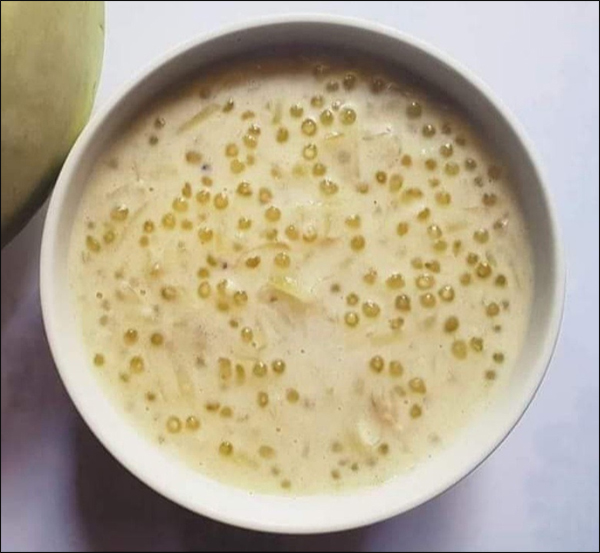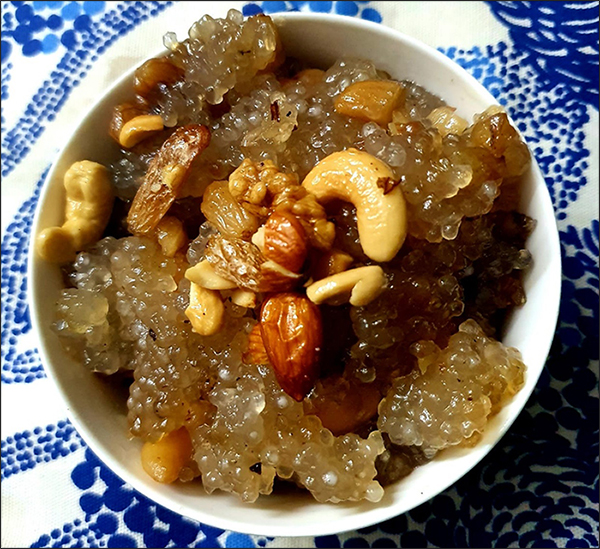Tapioca is a perennial plant which has partly woody stem and dark green leaves. This plant has tuberous roots that grow upwards from the base of stem. These tubers are the edible part of the tapioca plant from which tapioca starch is extracted. It is a type of starch extracted from tropical palms like Metroxylon sagu.

Tapioca or sabudana is neither a seed nor a fruit of the plant. It is a kind of starch which is obtained from cassava root tubers and free from proteins and fats.
- Family: Euphorbiaceae
- Sanskrit Name: Tarukandah
- Part Used: Roots (Tubers)
Tapioca is high in energy and has low fat content. It has numerous health benefits such as it is a good source of calcium and potassium which makes it an excellent source for bone health, maintains blood pressure and good for cardiovascular system.
It is used in various forms like puddings, kheer, gruel or soups. Sabudana is starch and for perfect sabudana, hydrate them in right amount of water and not to over-soak them to avoid paste like texture.

In India, sabudana is widely preferred during fasting season as it is a wholesome food and keeps the body full for longer.
Health Benefits of Sabudana (Tapioca Pearls)
1. For Weak Digestion
- Due to the presence of fibre content, it is an excellent food for digestive issues such as bloating, constipation and gas.
- It promotes the growth of gut microflora and it is much easier to digest as compared to other grains such as wheat, barley etc.
- Being gluten free, it is a good choice for patients suffering from celiac disease as it is also an anti-inflammatory agent.
- Sabudana khichdi is light for digestion.
2. For Bone Health
- Sabudana is high in calcium, iron and magnesium which makes the bones strong and improve bone density too.
- Consumption of tapioca also lowers the risk of osteoporosis and arthritis.
- It helps in repairing the damaged tissues and cells.
3. For Headache
- Sabudana in the form of gruel is very useful for headache or migraine.
- For relief in headache, it should be taken with jaggery or sugar candy.
- Sago in combination with rice is highly useful in Pitta disorders such as peptic ulcers, bilious headache, hepato-cellular disorders etc.
4. As a Baby Food
- Tapioca is a great source of energy for infants and it is one of the most common sources of starch that is added in baby food.
- It fulfils 50% baby’s energy requirements without interfering with the overall process of digestion.
- It is highly beneficial if the child is suffering from malabsorption or diarrhoea.
- The root of tapioca is loaded with calcium, potassium, iron, Vitamin K which are considered as essential minerals for babies and responsible for healthy growth and development.
5. Helps in Proper Development of Foetus
- Since it is a rich source of Vitamin B6 and folate, it aids in proper development of foetus during pregnancy. Folate is an essential element which is required in first few weeks of pregnancy.
- It also prevents neural defects in infants.
6. Acts as an Energy Booster
- Sabudana is full of energy and is often served as a meal during fasting and gives the feeling of satiety.
- These pearls are a great source of carbohydrates and contain little amounts of Vitamin C, minerals and traces of calcium.
- Therefore, it can be used as a substitute for expensive gym supplements like BCAA that is required by the body builders to promote muscle growth.
- Similarly, it can be used as pre-workout drink for the extra-shot of energy.
- Sabudana is inexpensive and reap the same benefits.
How to Test Purity of Sabudana?
Usually sago prepared from tapioca readily dissolves whereas original sago pearls take time to dissolve. It is a myth that white sabudana is pure and hygienic. Yellowish sabudana pearls are considered to be sweet and pure.
For testing its purity, dry the sago under sunshade for a day. After drying burn it in the open air. If it is pure, it will burn and swell without leaving any ash whereas sabudana which is adulterated will leave behind considerable amount of ash.
Disclaimer:-
This article is not a substitute to the standard Medical Diagnosis or personalized Ayurvedic Treatment! It is intended only for Information!
For experts consultation, please write us at care@blessayurveda.com or click here to book appointment to consult online.
2,613 total views, 3 views today